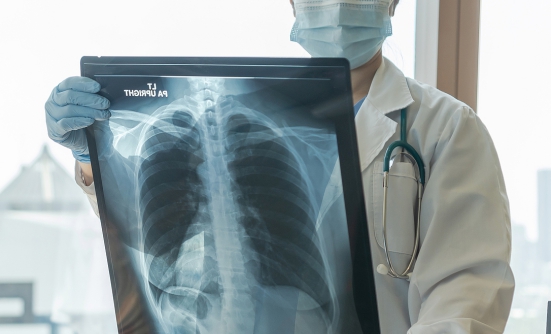Lung cancer continues to be the second most common cancer in the United States and the leading cause of cancer-related death for men and for women. Lung cancer is often diagnosed in a later stage, when treatment may be more challenging than when the cancer is detected early. Advances in medicine have led to new therapies in lung cancer that target specific biologic properties of a cancer, or biomarkers, within the tumor and improve the outcomes for patients.
In tandem with the advances in targeted therapies is the development of tests for biomarkers, which is very important in lung cancer, for matching patients with the best FDA-approved therapies that target a specific biomarker for the individual patient. This type of testing is also important for matching patients to appropriate clinical trials that are investigating new therapies for a specific type of lung cancer.
The Biomarkers in Lung Cancer
A biomarker is a protein, a molecule, or any other biologic feature of the human body that can be measured to evaluate the absence or presence of a specific disease or a marker of that disease. In lung cancer, finding and targeting the biomarkers in the 2 main types of lung cancer has led to huge strides in the treatment of the disease. The key word when talking about biomarkers is “measurable.” For example, blood sugar is the measurable biomarker for diabetes, and if a person has high blood sugar, he or she is diagnosed with diabetes.
It is important to understand that lung cancer is not one disease, but rather a group of several diseases. The 2 most common types of lung cancer are (1) non–small-cell lung cancer (NSCLC), which makes up the majority (about 85%) of lung cancer cases, and (2) small-cell lung cancer, which makes up about 15% of cases. Several biomarkers have been identified in each of these 2 types of lung cancer.
Biomarkers in NSCLC. NSCLC has 2 main groups of biomarkers. The first group of biomarkers is gene alterations. Mutations, translocations, and fusions are different types of gene alterations. These gene alterations encourage the growth of cancer cells, meaning that cells with these changes will grow quickly and form cancer. Therefore, if a treatment can block or dampen the effect of that gene alteration, it can effectively stop that cancer from developing.
The second group of biomarkers in NSCLC are specific features on the cancer cells that are related to the immune system, and therefore to immunotherapy. These biomarkers tell doctors whether the cancer with this type of biomarker will respond to immunotherapy, which is one of the newest treatments that have recently been added to the treatment regimen of lung cancer.
The most common immunotherapy- related biomarker is a protein that is made by cancer cells and is called PD-L1. Some cancer cells express or cover themselves with PD-L1 (like an invisibility cloak), which makes these cancer cells hide from the immune system. The more PD-L1 the cancer cells make, the easier it is to hide those cells from the immune system. Immunotherapy drugs, such as Keytruda (pembrolizumab), Opdivo (nivolumab), Imfinzi (durvalumab), and Tecentriq (atezolizumab), work on cancer cells by uncloacking the cells, so that the cancer cells become visible to the immune system, and the body then knows to attack the cancer cells and destroy the tumor.
Biomarkers in small-cell lung cancer. Biomarkers also exist in small-cell lung cancer, but they are slightly less well-known. For example, PD-L1 is also made by the cells in small-cell lung cancer, making it a very common biomarker across all lung cancers. However, compared with NSCLC, the same progress in understanding how gene alterations can be targeted has not been made in small-cell lung cancer, largely because of its aggressive nature, and for lack of adequate samples to do the same types of analyses.
Acquired versus Inherited Mutations
Mutations in lung cancer are usually discussed in a more general sense than in other types of cancer. For example, in breast or ovarian cancers, it is important to distinguish between acquired (or somatic) mutations that are not inherited from a parent, and inherited (germline or genetic) mutations that people are born with. But in lung cancer, acquired mutations are much more common than inherited mutations.
Testing for genetic (inherited) mutations in lung cancer is not very common, for 2 reasons. First, not many inherited mutations have been identified in lung cancer. Second, once an inherited mutation is identified in a patient with lung cancer, not much can be done, because no treatment is currently available for this type of mutations in lung cancer.
In a patient with breast cancer and an inherited mutation, the patient can have a mastectomy (surgical removal of the breasts), but if a genetic mutation is identified in the lungs, removing the lungs is not an option. Researchers are continuing to study the hereditary nature of lung cancer and the cause of the cancer to provide therapies that can work against it.
Unlike an inherited mutation, an acquired mutation is developed at some point during the person’s life, so it is not inherited from a parent. This type of mutation is also known as a sporadic mutation, meaning that an acquired mutation is a random mutation that can occur in any part of the body, at any time in one’s life, and this mutation can lead to cancer. In general, most types of cancer are caused by acquired rather than inherited mutations.
Is Smoking Linked to Lung Cancer Biomarkers?
It is important to remember that not all lung cancers are caused by smoking. In fact, only about 20% of diagnosed lung cancer cases today will be in people who are active smokers; the other 80% of people with lung cancer have either never smoked or are former smokers.
The 2 types of lung cancer that are usually associated with smoking are (1) squamous-cell lung cancer, a type of NSCLC, and (2) small-cell lung cancer. Cigarette smoke is a mutagen, meaning it causes mutations in the lungs, and therefore it increases the risk of lung cancer. A person who smokes has about 10 times higher risk of having mutations that can cause lung cancer than a person who does not smoke.
Because smoking causes mutations, and mutations are biomarkers, smoking will point doctors in the direction of certain biomarkers. For example, mutations in the KRAS gene are often seen in smokers with lung cancer, and certain drugs being tested in clinical trials today target KRAS mutations and have shown promise for lung cancer linked with this gene mutation.
Mutations may lead to the creation of abnormal or “funky” proteins. Smoking-related lung cancers tend to have many more of these “funky” proteins, which are more easily recognized by the immune system, because it has not seen them before. This means that smoking-related lung cancers tend to be more responsive to immunotherapy.
But smoking affects people differently. For example, the types of smoking-related mutations seen in Asian Americans are different from the mutations seen in white Americans.
Genetic or Biomarker Testing in Lung Cancer?
Although genetic testing for hereditary mutations does not play a large role in lung cancer, biomarker (including genomic) testing does. Understanding the difference between these 2 types of testing is crucial. Genomic testing looks for acquired mutations, such as EGFR, ALK, BRAF, ROS1, and NTRK, but these are not the only important biomarkers in lung cancer—remember PD-L1?
The most accurate and all-encompassing way of testing in lung cancer is biomarker testing, which covers all the tests that a patient with lung cancer should get, including genomic testing (for acquired mutations) as well as testing for PD-L1 expression, which predicts whether the tumor will respond to treatment with immunotherapy.
However, not all patients should get biomarker testing. For example, patients with early-stage lung cancer typically will have surgery to remove malignant tissue, without having any biomarker testing, mainly because biomarker testing at this early stage is not covered by health insurance. In addition, currently we don’t have drugs that target biomarkers in early-stage lung cancer. However, certain drugs, such as targeted therapies and immunotherapies, are currently being investigated for early-stage lung cancer, so it is likely that biomarker testing will eventually become common at this early stage of the disease.
In certain populations, such as patients with advanced-stage NSCLC, comprehensive biomarker testing is crucial. All patients with advanced-stage NSCLC should be tested for PD-L1 expression, and they should also be tested for mutations through multiple platforms, such as next-generation sequencing (a new technology of biomarker testing).
Next-generation sequencing can look for all the important mutations at once. About 5 or 10 years ago, when very few mutations had been identified in lung cancer, it made sense to test for only 1 mutation at a time. For example, a person might have been tested for an EGFR mutation, and if that test was negative, then that person would be tested for the ALK mutation.
But today, all patients with advanced lung cancer are being tested for 5 different targetable mutations at the same time, including EGFR, ALK, BRAF, ROS1, and NTRK; these 5 types of mutations are common in lung cancer and each mutation has several targeted therapies that specifically target one of these mutations. By using one test for all these mutations, the patient’s tissue is not being wasted, and the patient only needs to have the test once, instead of multiple times.
How Does Biomarker Testing Affect Treatment?
Before mutation-targeting treatments were discovered, patients with lung cancer typically received standard treatment with chemotherapy. But with advances in drug therapy, we now have targeted therapies that block (or inhibit) the specific biomarker or mutation that is associated with a patient’s lung cancer, and these therapies are available as oral therapies (pills), which is much more convenient for patients than chemotherapy. We also have immunotherapies available for patients with advanced-stage lung cancer.
Treating patients with lung cancer is based on using the right test (using next-generation sequencing platform and PD-L1 testing) for the right patient (those with advanced-stage cancer) at the right time (at diagnosis, disease progression, or disease recurrence) and finding the right drug. Based on these steps, the final step is determining the right treatment, meaning the best FDA-approved drug for the individual patient or a clinical trial if one is available.
The presence or absence of a biomarker affects the decision as to what is the right treatment, and it also ensures that the patient is not prescribed the wrong treatment. For example, if a patient has a targetable mutation, such as EGFR, and is prescribed an immunotherapy, that immunotherapy will cause harm to the patient instead of helping that patient.
For patients with lung cancer and EGFR mutation, 5 FDA-approved EGFR inhibitor options are available today, including Gilotrif (afatinib), Iressa (gefitinib), Tagrisso (osimertinib), Tarceva (erlotinib), and Vizimpro (dacomitinib).
In considering the treatment for a patient with an EGFR mutation, the doctor will want to start with the best first-line treatment, which is currently Tagrisso. Then, if the disease progresses or recurs (comes back), then a second-line treatment may be added to Tagrisso or another treatment will be considered. This is the reason that biomarker testing at the time of diagnosis of advanced-stage NSCLC is important, to determine what will be the best targeted therapy for initial treatment, as well as the second and third options, when needed.
Similarly, currently 5 drugs are approved for the treatment of patients with an ALK mutation, 1 treatment for patients with a BRAF mutation, 2 drugs for those with an NTRK mutation, and 3 treatments for those with a ROS1 mutation.
Overall, for any of these 5 targetable mutations, patients do much better with the oral targeted therapies than with chemotherapy. However, it is not possible to say that a patient with one type of mutation does better than a patient with a different type of mutation, simply because the biology of each of these mutations is so different.
When it comes to treating lung cancer effectively, if a patient has a targetable mutation and an FDA-approved drug is available to block that mutation, that patient would have much better results with the targeted drug than with any other available treatment. And the only way to find that targetable mutation is through biomarker testing.
Biomarker Testing and Clinical Trials
Another important component of comprehensive biomarker testing is its ability to identify a biomarker in a person’s cancer for which there is currently no approved treatment, but a clinical trial is available that is investigating a new treatment option.
This is especially important for patients who do not have any of the 5 targetable mutations mentioned earlier, so these patients currently cannot be treated with targeted therapy.
It is also important for those whose biomarker test results show that their tumor does not have PD-L1 expression, which means they should not receive immunotherapy. But these patients may have some other biomarkers for which there is a clinical trial available, and that may be better than chemotherapy, which otherwise may be their only available FDA-approved treatment option.
So overall, comprehensive biomarker testing is crucial for the diagnosis and treatment of patients with lung cancer to help patients have the best possible outcomes.
Key Points
- A biomarker is a protein, a molecule, or any biologic feature that can be measured to evaluate the absence or presence of a specific marker of that disease
- In lung cancer, acquired (or somatic) mutations are much more common than inherited (germline or genetic) mutations
- All patients with advanced lung cancer should be tested for 5 targetable mutations—EGFR, ALK, BRAF, ROS1, and NTRK— at the same time, as well as for PD-L1 protein expression
Patient Resources
LUNGevity Foundation
https://lungevity.org/for-patients-caregivers/lung-cancer-101/diagnosing-lung-cancer/biomarker-testing
National Cancer Institute
http://www.cancer.gov/about-cancer/treatment/types/targeted-therapies/targeted-therapies-fact-sheet















